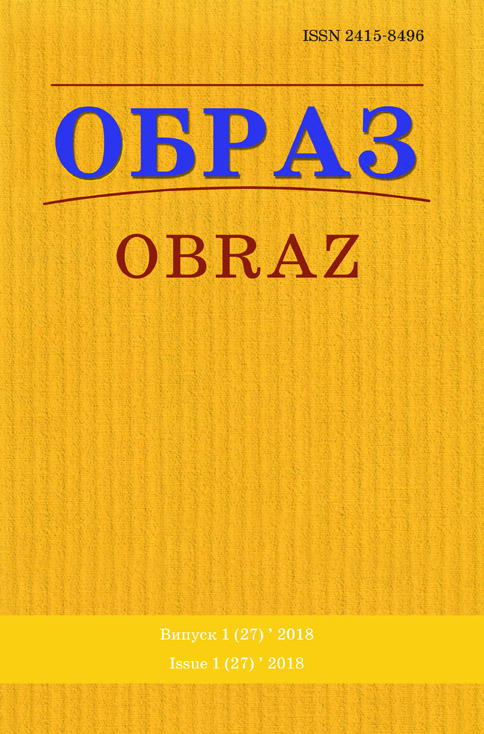Abstract
Introduction. During the years of independence the state language in Ukraine has been time and again the object of repression and destructive influences through the media, book publishing, show business, etc., and has almost been deprived of state care. Therefore one should focus on attempts to exploit the language issue in the interests of internal and external anti-Ukrainian forces.
Aim is to clarify Ukraine’s stance on the state language policy over the years of independence.
Method. Historical and genetic method has been used to determine changes in the language policy, to identify the peculiarities of the development of linguistic situations and factors that determine them; the empirical method has been used to study the documentary sources related to the language policy of Ukraine; the method of content monitoring has been used for automated information search on the Internet.
Results. The retrospective review of the language policy in Ukraine since 1991 to the present day has been conducted. A number of bills that directly or indirectly relate to the state language issues, in particular to their functioning in mass communication, have been analysed. The attempt has been made to define the main directions of the state language policy in modern Ukraine as a determining factor and the key sign of Ukrainian national identity; the analysis of the issues and contradictions in the implementation of state’s language policy has also been carried out.
Conclusions. The language policy in Ukraine should be consistent and balanced, and should comply with all legal instruments of international and regional organizations. Given the conclusions of the Venice Commission as to the language article of the law of Ukraine «On education», the Ministry of Education and Science of Ukraine should begin an effective dialogue with the representatives of national minorities and all interested parties regarding the language issue in education; should ensure that the execution of the Law does not threaten the preservation of the cultural heritage of minorities and the continuity of learning minority languages in traditional schools. Great importance should be attached to the adoption of a new languages law that would consider all the necessary aspects of the development of the state language and national minority languages.
References
1. Kyvalov, S. V. (2011), “Yes, our proposal is to make Russian the second language in Ukraine, but without detriment to Ukrainian”, Seghodnja [Today].
2. Kushnir, L. (2011), “Ukraine with another language”, Ukrajina Moloda [Young Ukraine], vol. 202.
3. Kuchkyna, A. (2017), “They are punished for café’s language and shops”, Vesty [News], no. 197, pp. 3.
4. Dmytrenko, N. (2011), “Our thought, our song will die and be lost?”, Ukrajina Moloda [Young Ukraine], vol. 201.
5. Salimonovych, L. (2018), “And what if the Word was ‘wry’”, Ukrajina Moloda [Young Ukraine], vol. 2.
6. Pozniak- Homenko, N. (2017), “Inconvenient press: Why did print media in Ukrainian appear to be on the brink of survival?”,Ukrajina Moloda [Young Ukraine], vol. 145.
7. Vitovych, I. (2016), “Diagnosis: Corruption”, Ukrajina Moloda [Young Ukraine], vol. 157.
8. (2017), “Is it better?! It’s terrible!”, 2000 [News], No. 51, December 21.
9. Trebor, I. (2017), “Europe has put an end to education scandal”, Seghodnja [Today], no. 229, December 12, p. 3.
10. Osypchuk, N. (2017), “Laudable goal with options. Conclusion of the Venice Commission regarding a language article in favour of Ukraine”, Ukrajina Moloda [Young Ukraine], vol. 149, December 13, p. 9.
11. Yevsieieva, H. P. (2011), “National language policy in Ukraine: symptoms and syndromes”, Visnyk Prydniprovsjkoji Derzhavnoji Academiji Budivnyctva ta Arkhitektury [Bulletin of the Prydniprovsjk State Academy of Construction and Architecture], no. 9, pp. 61–65.
12. Yevsieieva, H. P. (2011), “Implementation of national language policy in Ukraine: trends and prospects”, Visnyk Prydniprovsjkoji Derzhavnoji Academiji Budivnyctva ta Arkhitektury [Bulletin of the Prydniprovsjk State Academy of Construction and Architecture], no. 4, pp. 63–67.
13. Yevsieieva, H. P. (2011), “Ways of improving state language policy (based on the experience of regulatory acts of the Russian Federation)”, Visnyk Prydniprovskoyi Derzhavnoyi Akademiyi Budivnytstva ta Arkhitektury [Bulletin of Prydniprovsk State Academy of Civil Engineering and Architecture], n. 3, pp. 62–65.
14. Yevsieieva, H. (2009), “Language as a factor of national self-identification and state-building in Ukraine”, Derzhavne Upravlinnya ta Mistseve Samovryaduvannya [Public Administration and Local Government]: Zbirnyk Naukovykh Prats [Collection of Research Papers], DRIDUNADU [Dnipropetrovsk Regional Institute of Public Administration National Academy of Public Administration under the President of Ukraine – DRIPA NAPA], issue 1, pp. 3–13.
15. Kovaliova, T. (2008), “Specifics of conceptual and categorical framework formation of language policy”, available at: http://www.kbuapa.kharkov.ua/e-book/db/2008-1/doc/1/20.pdf (accessed 23 February 2018).
16. Lopushynskyi, I. P. (2011), “The determining role of the language factor in the state-building process of Ukraine”, Aktualni Problemy Derzhavnoho Upravlinnya, Pedahohiky ta Psykholohiyi [Pressing Problems of Public Administration, Pedagogy and Psychology]:Zbirnyk Naukovykh Prats Khersonskoho Natsionalnoho Tekhnychnoho Universytetu [Collection of Research Papers of Kherson National Technical University], no. 1 (4), pp. 28–34.
17. Lopushynskyi, I. P. (2008), Shaping and implementing national language policy in the field of education in Ukraine: Author’s Abstract of the Thesis for the Degree of Doctor of Science in Public Administration: Speciality 25.00.02, Mechanisms of Public Administration. Kyiv, 38 pp.
18. Marasjuk, S. S. (2010), «The factor of multiple ethnicity in building contemporary Ukrainian statehood», Hrani: Naukovo-teoretychnyi i hromadsko-politychnyi almanakh, no. 6, pp. 77–80.
19. Semenov, V. M. (2010), Historicalorigins of linguistic regionalization of Ukraine. In: Topical Issues of Public Administration,Collection of Research Papers. Kharkiv,Maghistr, pp. 204–209.
20. Kovaljchuk, Gh. V. (2007), of the issue of bilinguism in Odessa Region. In: Contemporary Pedagogical Education Issues: Pedagogy and Psychology, Issue 13, Pt2, pp. 97–102.

This work is licensed under a Creative Commons Attribution 4.0 International License.

